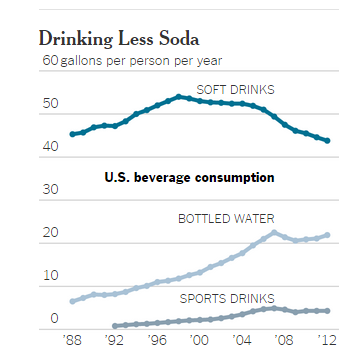Coca Cola PESTEL Analysis
Coca Cola is impacted by a set of political factors, both, in the US and abroad. These include, but not limited to the level of political stability in the country, impact of international pressure groups and domestic market lobbying groups and the government attitude towards the industry and the company.
There are few specific instances that illustrate the impact of political factors on Coca Cola performance. “One Day without Coca Cola” campaign launched by University organizations of the Social Nicaraguan Movement was a protest against the US-led invasion of Iraq with an inevitably negative impact on Coca Cola revenues in respective markets[1]. Similarly, Israeli attacks on Gaza in 2014 have caused some of the businesses in Turkey and more than 100 hotels in Mumbai stop selling products of Coca Cola Company[2].
Coca Cola sales are impacted by a set of economic factors that beyond of company’s control. These factors include the level of economic growth in the country and in the industry, tax rates and currency exchange rates, interest rates, labor costs and others. The global economic and financial crisis of 2007 – 2009 is a relevant example of an economic factor that greatly impacted the majority of businesses around the globe. However, the crisis has impacted Coca Cola to a lesser extent compared to many other businesses. Its operating margin remained at industry-front 22% despite the crisis, although dividend yield was reduced to 2.6%[3].
Arguably, fluctuations in exchange rate is the most significant economic factor that has adversely impacted Coca Cola performance in recent years. For example, due to severe currency devaluation in Venezuela, Coca Cola’s reported profits in this market has to be reduced by 55% in the fourth quarter of 2014 and there are similar instances in other parts of the world[4].
The pursuit of healthy lifestyle and increasing level of consumer health concerns towards obesity fuelled by sugar and carbonated drinks can be specified as the most important social change that has direct and significant effect on Coca Cola performance. Specifically, as it is illustrated in Figure 2 below, the amount of soft drinks consumption in the US has experienced a steady decline during the past 15 years, at the same time when the level of consumption of bottled water and the sports drinks has increased substantially.
Beverage consumption in the US[5]
Coca Cola is also greatly impacted by additional range of social factors such as demographic changes, changing family values and family patterns, media perception of the brand and health and welfare of target customer segment…
Complete version of Coca Cola PESTEL analysis containing discussion of remaining factors is available in Coca Cola Company Report. The report also contains application of SWOT, Porter’s Five Forces and Value-Chain Analyses on Coca Cola , along with analysis of Coca Cola’s marketing strategy and company’s approach towards Corporate Social Responsibility (CSR).
[1] Xinhua News Agency (2003), Available at: http://china.org.cn/english/features/60932.htm
[2] Timmons, H. (2014) Quarts, Available at: http://qz.com/239722/israels-attacks-on-gaza-are-causing-coca-cola-boycotts/
[3] Louth, N. (2012) Moneywise, Available at: http://www.moneywise.co.uk/investing/stocks-and-shares/10-global-companies-who-can-beat-the-economic-crisis
[4] McGrath, M. (2015) Forbes, Available at: http://www.forbes.com/sites/maggiemcgrath/2015/02/10/foreign-exchange-takes-the-air-out-of-coca-cola-fourth-quarter-profit/
[5] The New York Times (2014) Available at: http://www.nytimes.com/2014/03/01/business/challenges-for-coke-to-stay-on-top.html?_r=0


